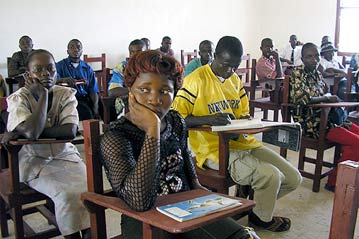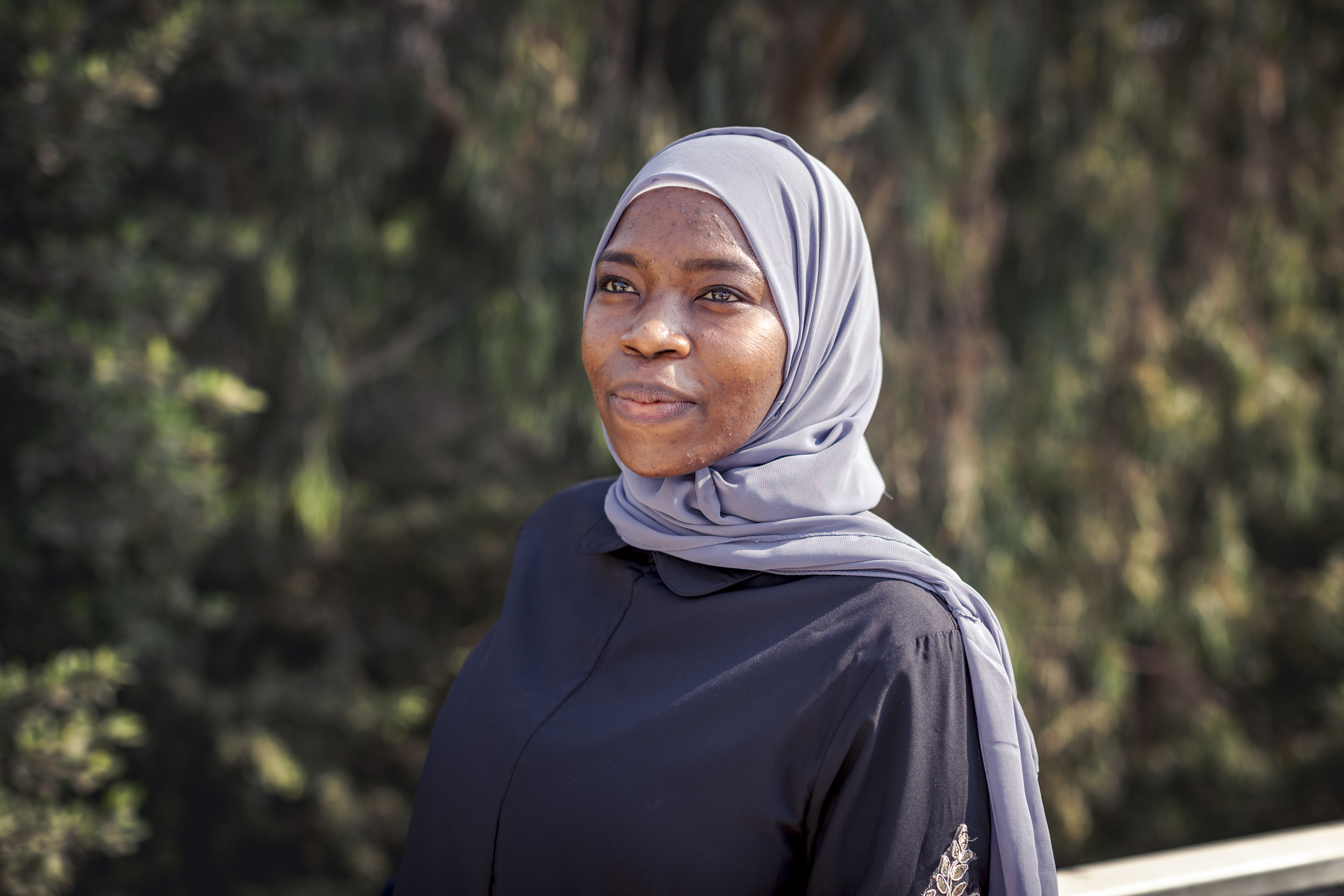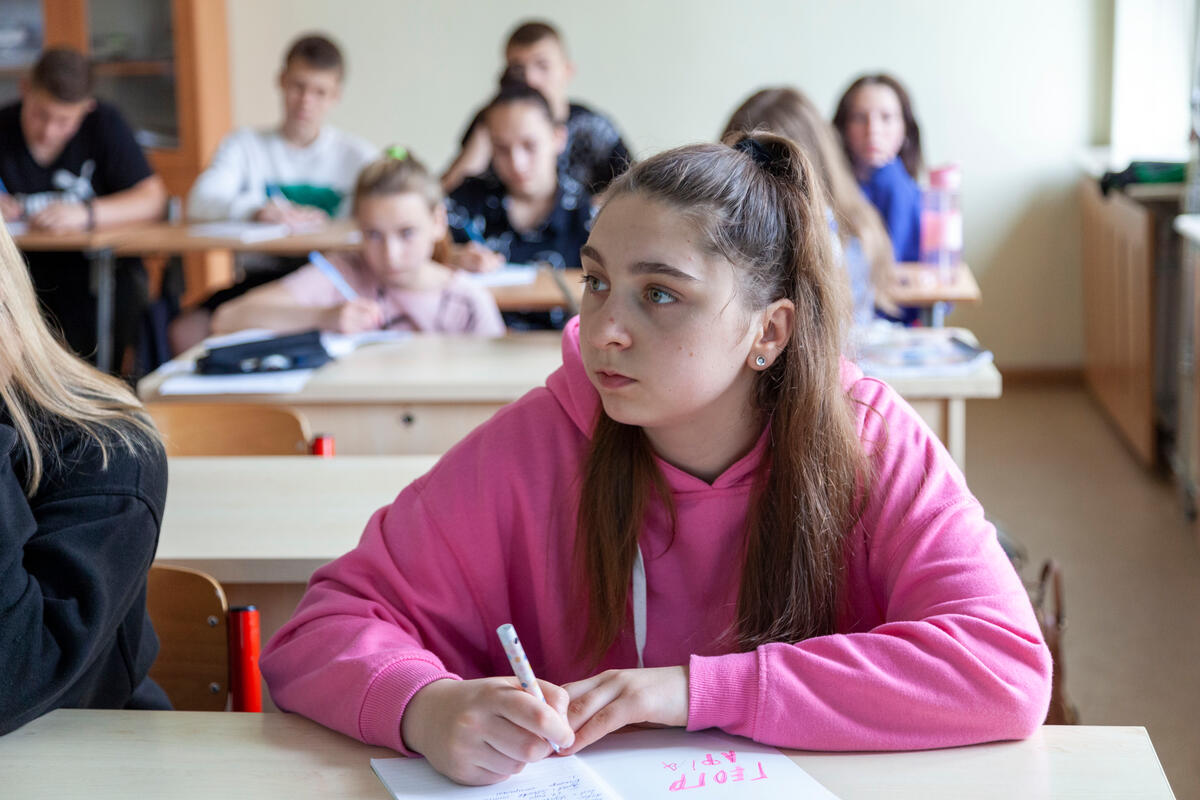With the shooting over, Liberian students aim high
With the shooting over, Liberian students aim high

BONG COUNTY, Liberia, September 23 (UNHCR) - On the top of a hill, outside the city of Gbarnga, a symbol of true prosperity overlooks Liberia's war-torn Bong County: it's Dolokelen Gboveh High School, once the most prestigious - indeed only - government-run secondary school in northern Liberia's Bong County.
Since it first opened its doors in 1956, it laid the solid academic foundations for several generations of future lawyers, doctors or scholars, some of whom later made their way overseas to Europe and America - a fact that today still fills the citizens of Gbarnga with pride. Over the decades, the school attracted thousands of young men and women from Bong and neighbouring Nimba, Lofa and Gbarpolu Counties, with up to 1,500 students attending per year.
Then the civil war came. All of a sudden education and culture became largely irrelevant - relegated to mere memories in the minds of those who longed for the return of peace and normality. In the mid-1990s, the school was partly destroyed by Charles Taylor's forces. Then, in 2002, armed rebels belonging to LURD (Liberians United for Reconciliation and Democracy) vandalized or demolished what was left.
Many of the gunmen belonging to the various armed factions that tore Liberia apart were children or teenagers, who a generation earlier would have been sitting behind a desk in school, learning history or mathematics.
In early July 2005, the school still looked like an open wound to the people of Bong County. Now, only ten weeks later, it has once more become a symbol of hope.
Earlier this week, after two months of intense labour by an army of 80 local workers had transformed it from a ruin back into an educational establishment, Dolokelen Gboveh High School reopened its doors to students.
The work was funded and supported in other ways - for example in the provision of 450 desks - by the UN refugee agency. Ahmed Conteh, the Project Manager for African Concern International (ACI) - UNHCR's NGO partner - even attributes a reduction in the crime rate in Gbarnga to the employment of so many men to rebuild the school over the summer months
The residents of Gbarnga have welcomed the reconstruction of the high school as an important step in the effort to steer Liberia's youth towards a more peaceful future. Volunteers patrol on a regular basis to ensure the safety of the compound and have promised to build a fence around it. They are eager not to see their school, and all the hopes that it has raised, harmed again.
"Our minds are finally reawakening", says the school's Principal, Edwin G. Kwakpae, who came through the terrible years following the school's destruction in 1997. Now, walking along the corridors past the nine classrooms in the building's two main wings, he exudes an air of renewed self-confidence: "This is a cardinal institution, not only for our County, but for the whole of northern Liberia. It's reassuring to see things improving."
The paint is still fresh. Inside the classrooms, students over the age of 15 (some in their early 20s), sit attentively at their desks, listening to the teacher. It's Monday 19 September, their first day back in their transformed school. The first day's timetable includes history, chemistry and mathematics lessons. They are excited. The students' association wants to debate social concerns and embark on peace education and reconciliation workshops.
So far, some 200 students have enrolled. The Principal, however, expects that to rise to as much as 900. "Even some ex-fighters are serious about going back to school and learning now," he says. "We have to bring them back to school, if we want them to have a future." In the case of ex-child soldiers, the school's relatively modest fees (around US$22 per semester) are paid by the UN Development Programme.
The situation confronting Liberian teachers is still creating headaches for Edwin G. Kwakpae: "Right now we have 26 teachers on the Government's payroll." he says. "But their pay is too low. That's why they are looking for other jobs." As civil servants, teachers currently earn about 1,245 Liberian Dollars a month (around US$21). However, some hope lies in the so-called Governance Economic Management Assistance Program (GEMAP) - a document the Chairman of the Transitional Government of Liberia, Gyude Bryant, signed recently. Among other aims, GEMAP is supposed to ensure the regular payment of decent salaries for civil servants as part of the effort to reduce corruption in Liberia.
Meanwhile, UNHCR is encouraging Liberian teachers and doctors to come back from neighbouring countries of asylum, through its Skilled Labour Programme. The main aim of this reintegration project, launched in July in northern Lofa County, is to make it possible for skilled returnees like doctors, nurses, engineers or teachers, (2,297 of whom are still known to be in refugee camps) to quickly slot back into society, through the immediate provision of a livelihood, as well as somewhere to live, agricultural kits and assistance through micro-financing. 1000 teachers and 100 medical personnel are supposed to profit from this programme by the end of 2006.
Back in Dolokelen Gboveh High School, the first school day comes to an end. Sarina, a 24 year-old student, sits quietly in the second row. She recently won a Bong County "Best Student" award, and will soon participate in the nation-wide contest. Everybody is proud of her.
"Girls and women can make a big difference", she says, smiling shyly. "We can do things men do. We do them even better. It's time for us to take over," she adds. Her classmates - male and female - agree.
Seeing them studying again, working eagerly towards a better future, should not come as a surprise. After all, they are students of the famous Dolokelen Gboveh High School. And a saying, written on the school's Auditorium wall, which has survived the destruction, reads: "Aim high."
By Annette Rehrl in Bong County, Liberia








